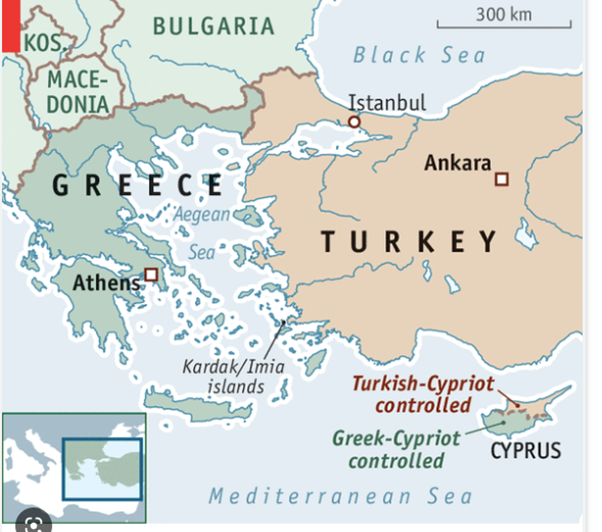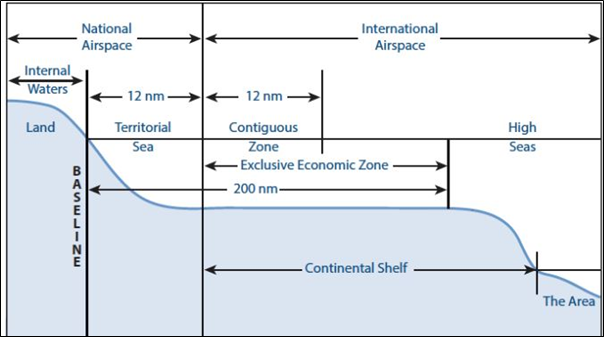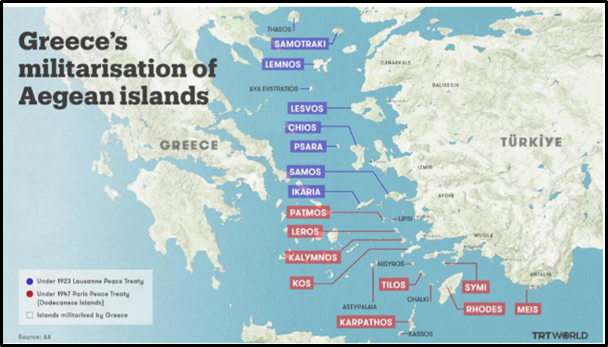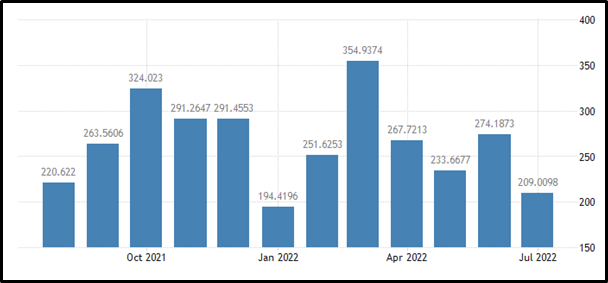
Indian Council of World Affairs
Sapru House, New DelhiThe Greco -Turkish dispute over the Aegean Sea
The current political situation in Europe is dominated by the Russia-Ukraine crisis, but this is not the only conflict fraying Europe’s eastern borders. Tensions have been rising between Greece and Turkey over territorial and airspace claims in and over the Aegean Sea. Despite being NATO allies, Athens and Ankara have been at odds on maritime issues concerning the Aegean Sea since the 1970s, with both asserting rival claims over their borders in the Sea.[i] In one of the latest spats on August 23, 2022, according to Turkish Defence Ministry sources, NATO AWACS aircraft and two Turkish F-16s carrying out the ‘Nexus Ace Training Mission’[ii] over the Aegean and Eastern Mediterranean were 'radar locked' by the Greek S-300 air defence systems deployed on the Island of Crete.[iii] However, Athens dismissed Ankara’s claim as unfounded and false, noting that Turkish fighters were involved in a military exercise under NATO cover.[iv]
In a further escalation of tensions, Turkish President Recep Tayyip Erdoğan, on September 3, 2022, accused Greece of militarising islands in the Eastern Aegean, near the Turkish coast, in violation of peace treaties signed after World Wars I and II. President Erdogan said, “Your occupation of the islands does not bind us. When the time, the hour, comes, we will do what is necessary. As we say, we may come suddenly one night”.[v] In response, Greek Foreign Minister Nikos Dendias said anyone who dreams of conquest and attack should consider it three or four times. “We are in a position to defend our country, independence, and territorial integrity”.[vi] These events have rekindled the long-standing tensions between Greece and Turkey.
This paper discusses the causes and implications of the Aegean Sea crisis between the two countries. It further explores the reasons why the Aegean Sea is at the centre of Greek-Turkish ties.
Importance of the Aegean Sea:

Source: The Economist
The Aegean Sea, spanning over two lakh square kilometres, is an elongated embayment[vii] of the Mediterranean Sea. It is located in the East Mediterranean Basin, with the Greek peninsula to its west and Anatolia (consisting of the Asian side of Turkey) to its east. Historically, the Aegean Sea has been the cradle of Greek and Western Turkish civilisations and includes more than a thousand islands, almost all Greek, and some within two kilometres of the Turkish mainland.[viii] To the north, the Aegean Sea is connected to the Marmara Sea and the Black Sea by the straits of the Dardanelles and the Bosphorus, while to the south, it is bordered by the Island of Crete. In addition to its strategic location, the Aegean Sea is a significant commercial hub, as it lies on the axis of some major navigable routes connecting the Mediterranean Sea to the Sea of Marmara and the Black Sea, which opens passage without land obstruction toward three continents, viz. Asia, Africa, and Europe.
The Eastern Mediterranean region in the Aegean Sea is also rich in oil reserves. A discovery in 2018 by an Italian company revealed oil reserves of 3.5 trillion cubic meters, which Greece, Egypt, Cyprus, and Turkey are eager to claim.[ix] The two most important oilfields of the region include - The Epsilon oilfield ( located at a water depth of 30m in the northern Aegean Sea) and the Prinos oil field ( located in the northern Aegean Sea, between the island of Thasos and the city of Kavala on the mainland). The European Union, also in a large way, depends on this region as it seeks to cut down on its dependence on Russian gas, which accounts for 37 per cent of Europe’s gas supplies.[x]
Causes of the Conflict
Greece and Turkey have had a history of conflict. The two countries fought their independence wars against one another and developed their national identities in opposition to one another. Greece seceded from the Ottoman Empire in 1830, and the Turkish Republic was established after the Greek army was defeated in Asia Minor in 1922. Additionally, since 1974, Greece and Turkey have been at odds over the Aegean Sea, and the main causes can be divided into several categories, including:
Historical Animosity
Historically, differences between Greece and Turkey over the Aegean Sea are related to the Aegean Status Quo established by the Lausanne Peace Treaty of 1923, the Montreux Convention Regarding the Regime of the Straits (1936) and the Paris Peace Treaties of 1947. According to the Lausanne Treaty, the boundaries of Greece and Turkey were defined, and several islands, islets, and large areas of land beyond three miles from the Turkish coast were ceded to Greece; except for three groups of islands - Imbros, Tenedos, and Rabbit islands. The Treaty further required Greece to keep the islands[xi] demilitarised, opened the passage for civilian shipping in the Turkish Straits, and mandated Ankara to demilitarise the straits. Turkey also ceded Cyprus to the British. The l936 Montreux Convention, which established the regime of the Turkish Straits, did not bring any change to the status of the islands. But under the Paris Peace Treaties of 1947, the Dodecanese Islands[xii] were transferred to Greece, with the same obligation for permanent and total demilitarisation. While Ankara recognises these treaties, Athens accuses it of wrongly interpreting them and argues that the 1936 Montreux Convention Regarding the Regime of the Straits[xiii] superseded the Lausanne Treaty on the Straits, as it gave Turkey the power to militarise the Turkish Straits, hence nullifying the obligation upon Greece to demilitarise the Aegean Islands.[xiv]
The issue of Delimitation of Territorial Waters[xv]
The breadth of territorial waters in the Aegean Sea is another source of conflict. Since 1936, both Greece and Turkey have claimed a 6 nautical-mile (nm) territorial sea in the Aegean. Under the present 6-mile limit (observed by both parties), the Greek territorial sea comprises approximately 43.5 per cent of the Aegean Sea. For Turkey, the same percentage is 7.5 per cent. The remaining 49 per cent is high seas.[xvi] However, the United Nations Convention on the Law of the Sea 1982 (UNCLOS) allows States to extend their territorial sea up to 12 nm from the shore. Therefore, if the territorial waters of the two countries were extended to 12 nautical miles - as stated by the 1982 UNCLOS[xvii], which, unlike Turkey, was ratified by Greece in 1997 – around 71.5 per cent of the Aegean Sea would be under Greek sovereignty, and 8.7 per cent Turkish.[xviii] The impact of such a Greek extension (of its territorial waters) would deprive Turkey of one of the two coastal islands (Imbros and Tenedos) of the Aegean Sea, her rights to access the high seas from her territorial waters, as well as the economic benefits derived from the Aegean[xix]. Thus, any increase beyond 6 miles is unacceptable to Turkey and would represent a Casus Belli (cause of war).

Source: National Oceanic and Atmospheric Administration (NOAA)
The issue of Delimitation and use of the Continental Shelf[xx]
The Aegean Continental Shelf constitutes a dispute between Turkey and Greece since there is no delimitation agreement between the two countries. This contention over the Continental Shelf had existed since 1973 when Greece discovered the Prinos oilfield[xxi] in the north Aegean. Tensions rose again in 2014 when a seismic survey in the Ionian Sea and south of Crete suggested that Greece could be sitting on 70-90 trillion cubic feet (2-2.5 trillion cubic metres) of natural gas, with recoverable reserves estimated at $250bn at today’s high prices.[xxii] In 2016, the Greek government leased four major offshore concessions and three onshore concessions to international oil and gas companies such as ExxonMobil, Total, and Repsol, along with Greek companies like Energean and Hellenic Petroleum. Over the same period, Turkey spent almost one billion dollars on two seismic survey ships and three drill ships, indicating its determination not to be left behind in the race for hydrocarbon wealth.[xxiii]
In 2020, tensions flared again when Turkey sent its seismic research vessel Oruc Reis to map potential drilling opportunities near the Greek island of Kastellorizo.[xxiv] While Athens believes that Greek islands in the Aegean Sea must be considered in delineating its continental shelf by the UNCLOS, Ankara (a non-signatory to UNCLOS) believes that a country's continental shelf should be measured from its mainland. As a result, Turkey does not recognise Greece's claim that its territorial waters begin immediately south of Kastellorizo, the most distant Greek outpost in the disputed area.
The issue of Demilitarised status of the Eastern Aegean islands
Due to the security requirements, the demilitarised status of the Eastern Aegean islands has been an essential element of political balance between the two countries. Ankara has expressed concerns over the militarisation of the Eastern Aegean islands in violation of the 1923 Treaty of Lausanne and the 1947 Paris Treaty. Turkey claims that the islands were ceded to Greece on the condition that they remain demilitarised. Meanwhile, Greece argues that Turkey has deliberately misinterpreted the above treaties regarding armed forces on its eastern islands and contends that its policy of militarisation of islands is a “right of self-defence”.[xxv] Athens further states that the islands, which have been garrisoned for decades and lie within close striking distance of a large Turkish landing fleet, cannot be left undefended.[xxvi]

Source: TRT News
Air Space Violations
Air space violations over the Aegean Sea remain a significant source of contention between the two countries. Athens and Ankara have accused one another of conducting flights near or over their coasts. Turkey claimed that Greece violated Ankara’s airspace and territorial waters 1,123 times in the first eight months of 2022.[xxvii] While on the other hand, in a recent incident, Greece also accused Turkey of 78 violations of Greek airspace on August 24, 2022, with 23 planes, 15 of which were armed. Another core of the conflict on the Aegean airspace is the persistent abuse of the Flight Information Region (FIR)[xxviii]. In early August 2022, Turkish fighter jets and unmanned aerial vehicles violated the Air Traffic Rules 52 times in the Athens FIR.[xxix] Ankara has also made similar accusations about Greek warplanes violating its airspace over the Aegean Sea.
Implications
As Athens and Ankara escalate their war of words, NATO member countries are worried that these rising tensions will further undermine the Alliance's already fractured unity in mounting a united front against Moscow following the ongoing conflict between Russia and Ukraine. NATO members fear that if the tension escalates to the point of hostilities, “Russian President Vladimir Putin can take advantage of these little cracks appearing in European unity and can make them even larger. This will not only undercut European unity but also can spill over into NATO councils if one or the other country uses NATO as a weapon to hurt the other”.[xxx] Given this apparent conundrum, NATO Secretary-General Jens Stoltenberg encouraged Greece and Turkey to settle their differences and avoid any action or rhetoric that could escalate the situation.[xxxi]
Furthermore, the rising tensions between Athens and Ankara will provide opportunities for actors, such as Russia, to gain influence in the European neighbourhood. This is certainly the case in Turkey and Greece - two of the most vulnerable countries to Russian influence operations in the region due to a mix of relative geographic proximity to Russia, common cultural and historic legacies, and elites that have looked to Moscow and beyond, to balance their countries’ foreign policies or gain leverage with transatlantic partners.[xxxii] This assertiveness of Russia in the Eastern Mediterranean will further undermine NATO and the European Union (EU) cohesion, making it more difficult for the Western alliance to operate, plan, and formulate policies.
Another major implication of the rising hostility between Greece and Turkey is its effect on the economic partnership between the two countries. A severe blow could be dealt to the Turkish-Greek Joint Economic Commission (JEC), which convened its Fifth Meeting on January 24, 2022, in Athens after 11 years of inactivity. The trade volume between the two countries has tripled since 2005, and exports to Greece from Turkey increased by 73.3 per cent in 2021, resulting in a trade surplus of approximately $1 billion.[xxxiii] But the rising friction between the two countries over their dominance in the Aegean Sea could negatively affect their bilateral trade. The following graph shows that as tensions between Athens and Ankara escalated, exports to Greece from Turkey decreased from 274.19 USD Million in June to 209.01 USD Million in July.

Source: Turkish Statistical Institute (TURKSTAT)
Tourism is another sector that is bearing the brunt of the brewing hostility between Athens and Ankara over the Aegean Sea. The Aegean region is a vital lifeline for the tourism industry of both countries. But Turkey and Greece’s historic Aegean dispute is impacting Tourism Marketing. The tourism industry of the two countries have expressed their anguish over the intermingling of tourism with geopolitics and have argued that “It is a real pity that tourism, with its philosophy and purpose of connecting people, cultures and celebrating unique experiences, is now being dragged into this clash”.[xxxiv] Adding to this hostility is the recent tourism campaign of Turkey titled "Turk Aegean", which Greece interprets as an attempt by Turkey to legitimise its decades-old claims over the Aegean Sea.[xxxv]
Conclusion
An amicable resolution of the Aegean dispute can only be achieved if both parties (Greece and Turkey) abandon the zero-sum approach (meaning the loss of one party equals the gain of the other) and cultivate the belief that mutually beneficial solutions can be found. In the current scenario, the complexity of the Aegean dispute under international law is further exacerbated by a lack of diplomacy. In this regard, NATO and the EU are working to de-escalate the conflict between Athens and Ankara by reducing high-pitched rhetoric by both sides and encouraging both parties to maintain open lines of communication. Thus, peaceful dispute resolution through dialogue is pivotal to avoiding an open conflict between Greece and Turkey.
*****
*Aashriti Gautam, Research Intern, Indian Council of World Affairs, Sapru House, New Delhi.
Disclaimer: The views are of the author.
Endnotes
[i] The Greek-Turkish Dispute in the Aegean Sea: Its Ramifications for NATO and The Prospects for Resolution, by Stephen Mann, California, March 2001, https://www.hsdl.org/?view&did=450238, 28 October 2021
[ii] The Nexus Ace is a tactical-level training mission carried out routinely by Turkish combat aircraft together with NATO's AWACS aircraft.
[iii]Greece's S-300 air Defence system harassed Turkish F-16 jets, Daily Sabah, 28 August 2022, https://www.dailysabah.com/politics/diplomacy/greeces-s-300-air-defense-system-harassed-turkish-f-16-jets-sources,Accessed on 1 October 2022.
[iv] Ankara resorts to fake news over violations, Ekathimerini, 28 August 2022, https://www.ekathimerini.com/news/1191823/ankara-resorts-to-fake-news-over-violations/, Accessed on 1 October 2022.
[v] Erdoğan warns Greece over Aegean airspace violations, Hurriyet Daily News, 04 September 2022,
https://www.hurriyetdailynews.com/erdogan-warns-greece-over-aegean-airspace-violations-176637, Accessed on 1 October 2022.
[vi] Tension rises as Turkey, Greece voice festering grievances, AP News, Andrew Wilks, 07 September 2022,
https://apnews.com/article/nato-middle-east-greece-recep-tayyip-erdogan 19903884a66cd3116ee318b8d0283ccd, Accessed on 1 October 2022.
[vii] An Embayment is an extension of the sea into an indentation of the coast. From Springer Link, https://link.springer.com/referenceworkentry/10.1007/0-387-30843-1_205#, Accessed on 12 October 2022.
[viii] Explained | Why are Turkey and Greece at odds over islands in the Aegean Sea? The Hindu, Diksha Munjal, 14 June 2022, https://www.thehindu.com/news/international/explained-why-are-turkey-and-greece-at-odds-over-islands-in-the-aegean-sea/article65518758.ece, Accessed on 2 October 2022.
[ix] Turbulence in the Aegean Sea, Synergia Foundation, 31 August 2022, https://www.synergiafoundation.org/insights/analyses-assessments/turbulence-aegean-sea, Accessed on 2 October 2022
[x] Turbulence in the Aegean Sea, Synergia Foundation, 31 August 2022, https://www.synergiafoundation.org/insights/analyses-assessments/turbulence-aegean-sea, Accessed on 2 October 2022
[xi] Article 13 of the Laussane Treaty stipulated the modalities of the demilitarization for the islands of Lesvos, Chios, Samos, and Ikaria.
[xii] The Dodecanese Islands include Stampalia, Rhodes, Calki, Scarpanto, Casos, Piscopis, Nisiros, Calimnos, Leros, Patmos, Lipsos, Symi, Cos and Castellorizo.
[xiii] Under the Montreux Accord, Turkey has control over the Bosphorus and Dardanelles and the power to regulate the transit of naval warships. It guarantees complete freedom of passage for all civilian vessels in times of peace.
But when Turkey is at war, or feels threatened by a war, it may take any decision about the passage of warships as it sees fit. Turkey can even fortify the straits in case of conflict under the Treaty.
[xiv] Explained | Why are Turkey and Greece at odds over islands in the Aegean Sea? The Hindu, Diksha Munjal, 14 June 2022, https://www.thehindu.com/news/international/explained-why-are-turkey-and-greece-at-odds-over-islands-in-the-aegean-sea/article65518758.ece, Accessed on 2 October 2022.
[xv] The term territorial waters refer to that area of the sea immediately adjacent to a state's shores and subject to that state's territorial jurisdiction. It extends seaward up to 12 nautical miles (nm). From Science Direct, https://www.sciencedirect.com/topics/earth-and-planetary-sciences/territorial-sea, Accessed on 17 October 2022.
[xvi] Background Note on Aegean Dispute, Republic of Turkey, ministry of foreign Affairs, https://www.mfa.gov.tr/background-note-on-aegean-dispute.en.mfa, Accessed on 2 October 2022.
[xvii] UNCLOS, also called the Law of the Sea Convention or the Law of the Sea Treaty, is an international agreement that establishes a legal framework for all marine and maritime activities, adopted in 1982. From International Maritime Organisation (IMO) https://www.imo.org/en/OurWork/Legal/Pages/UnitedNationsConventionOnTheLawOfTheSea.aspx, Accessed on 17 October 2022.
[xviii]The Greco-Turkish dispute over the Aegean Sea: a possible solution? Diploweb, Didier Ortolland, 10 April 2009, https://www.diploweb.com/The-Greco-Turkish-dispute-over-the.html, Accessed on 2 October 2022.
[xix] Background Note on Aegean Dispute, Republic of Turkey, ministry of foreign Affairs, https://www.mfa.gov.tr/background-note-on-aegean-dispute.en.mfa, Accessed on 2 October 2022.
[xx] The shallow submerged extension of the continent is called the Continental Shelf. It extends beyond the territorial sea to the outer edge of the continental margin or 200 nautical miles. The Continental Shelf also refers to a littoral state's exclusive right to economic exploitation of resources on and under the sea-bed, for instance oil drilling, in an area adjacent to its territorial waters and extending into the High Seas. From UN- Divison of Oceans and Law of the Seas, https://www.un.org/depts/los/clcs_new/continental_shelf_description.htm, Accessed on 2 October 2022.
[xxi] The Prinos oil field is located in the northern Aegean Sea, between the island of Thasos and city of Kavala in northern Greece. The Prinos conventional oil field recovered 90.15% of its total recoverable reserves, with peak production in 1985. Based on economic assumptions, production will continue until the field reaches its economic limit in 2032. From Prinos Conventional Oil Field, Greece, By Carmen, https://www.offshore-technology.com/marketdata/prinos-conventional-oil-field-greece/, Accessed on 10 November 2022.
[xxii] Turkey opens new dispute over sovereignty of east Aegean islands, Al Jazeera , by John Psaropoulos, February 8, 2022, https://www.aljazeera.com/news/2022/2/8/turkey-opens-new-dispute-over-sovereignty-of-east-aegean-islands, Accessed on 12 October 2022.
[xxiii] Turkey opens new dispute over sovereignty of east Aegean islands, Al Jazeera , by John Psaropoulos, February 8, 2022, https://www.aljazeera.com/news/2022/2/8/turkey-opens-new-dispute-over-sovereignty-of-east-aegean-islands, Accessed on 12 October 2022.
[xxiv] Turkey's Oruc Reis survey vessel back near southern shore, ship tracker shows, Reuters, Ali Kucukgocmen, George Georgiopoulos, 13 September 2022, https://www.reuters.com/article/uk-turkey-greece-idUKKBN2640F1, Accessed on 2 October 2022.
[xxv] Turkey calls on Greece to demilitarize Aegean islands, AP News, 07 June 2022, https://apnews.com/article/politics-mevlut-cavusoglu-greece-turkey-f8dc5e16d18117222bc1fa02ecedcac2, Accessed on 2 October 2022.
[xxvi]Turkey’s Erdogan warns Greece to demilitarize Aegean islands, AP NEWS, 10 June 2022, https://apnews.com/article/recep-tayyip-erdogan-turkey-middle-east-natoa504ec58cc242762db5e3a5ec7dade67, Accessed on 2 October 2022.
[xxvii] Greece committed 1,123 violations of Türkiye's airspace, territorial waters this year', Anadolu Agency, 04 September 2022, https://www.aa.com.tr/en/turkiye/greece-committed-1-123-violations-of-turkiyes-airspace-territorial-waters-this-year/2676657, Accessed on 2 October 2022.
[xxviii] In aviation, a Flight Information Region (FIR) is a specified region of airspace in which a flight information service and an alerting service (ALRS) are provided. FIR encompasses the territorial airspace and the airspace over the high seas. From Euro Control, https://ansperformance.eu/acronym/fir/, Accessed on 2 October 2022.
[xxix] Turkish F-16 and other aircraft violate Greece’s airspace 52 times, Keep Talking Greece, 03 August 2022,
https://www.keeptalkinggreece.com/2022/08/03/turkish-jets-aircraft-violations-greece-airspace/, Accessed on 3 October 2022.
[xxx] Turkey-Greece Tensions Could Disrupt NATO Unity, Experts Warn, VOA News, Begum Donmez Ersoz, 10 September 2022, https://www.voanews.com/a/turkey-greece-tensions-could-disrupt-nato-unity-experts-warn/6739413.html, Accessed on 3 October 2022.
[xxxi] Why Turkey, Greece remain on collision course over Aegean islands, Al Jazeera, Thomas O Falk, 20 June 2022, https://www.aljazeera.com/features/2022/6/20/why-turkey-greece-remain-on-collision-course-over-aegean-islands, Accessed on 3 October 2022.
[xxxii] A Difficult Balancing Act: Russia’s Role in the Eastern Mediterranean, Carnegie Endowment for International Peace, Paul Stronski, 28 June 2021, https://carnegieendowment.org/2021/06/28/difficult-balancing-act-russia-s-role-in-eastern-mediterranean-pub-84847, Accessed on 3 October 2022.
[xxxiii] Turkey, Greece sign protocol to develop bilateral trade, co-op, Daily Sabah, 26 January 2022,
https://www.dailysabah.com/business/economy/turkey-greece-sign-protocol-to-develop-bilateral-trade-co-op, Accessed on 3 October 2022.
[xxxiv] Turkey and Greece’s Historic Aegean Dispute Flares Up Over Tourism Marketing, Skift, Peden Doma, 12 July 2022, https://skift.com/2022/07/12/turkey-and-greeces-historic-aegean-dispute-flares-up-over-tourism-marketing/, Accessed on 3 October 2022.
[xxxv] Turkey and Greece’s Historic Aegean Dispute Flares Up Over Tourism Marketing, Skift, Peden Doma, 12 July 2022, https://skift.com/2022/07/12/turkey-and-greeces-historic-aegean-dispute-flares-up-over-tourism-marketing/, Accessed on 3 October 2022.















